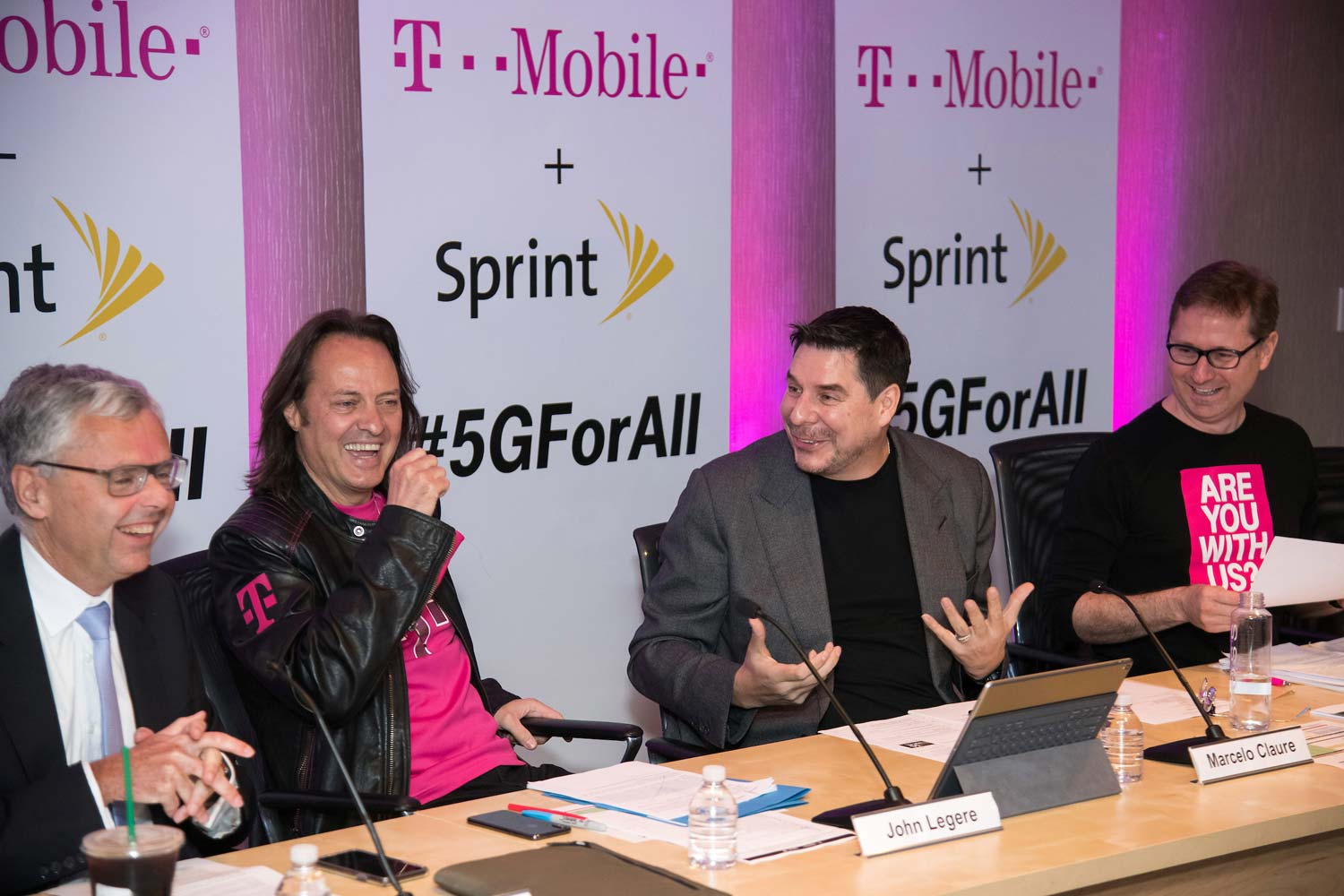T-Mobile and Sprint Modify Merger Plans as DOJ Leans Against Deal
The head of the FCC is now backing the merger of Sprint and T-Mobile after the two carriers promised to speed up 5G deployment and address prepaid service competition. Here's what those changes mean for your wireless needs.
T-Mobile's planned merger with Sprint took a big step forward today (May 20) but also a notable step back.
Ajit Pai, chairman of the Federal Communications Commission, indicated he would back the combination of the two wireless carriers. But to get Pai's approval, T-Mobile and Sprint had to make some commitments about future service that's certain to impact wireless customers.

The Sprint/T-Mobile deal needs more than just Pai's backing, though. The U.S. Department of Justice still needs to approve the merger as well, and according to a Bloomberg report, officials are leaning against the deal due to concerns about competition and prices.
Normailly, gaining the OK of the FCC chairman of the Republican-controlled panel suggests that approval is likely. But at this moment the deal is up in the air.
“In light of the significant commitments made by T-Mobile and Sprint as well as the facts in the record to date, I believe that this transaction is in the public interest and intend to recommend to my colleagues that the FCC approve it," Pai said in a statement released today. "This is a unique opportunity to speed up the deployment of 5G throughout the United States and bring much faster mobile broadband to rural Americans. We should seize this opportunity.”
Winning Pai's support required Sprint and T-Mobile to modify some of the terms of the deal to address concerns about 5G deployment and rural coverage, which the two companies spelled out in a letter to the FCC. Here's how the promised changes may affect your wireless coverage, should the merger go through.
Boost Mobile will be sold
Sign up to get the BEST of Tom's Guide direct to your inbox.
Get instant access to breaking news, the hottest reviews, great deals and helpful tips.
One bone of contention with the Sprint/T-Mobile merger has been what combining two of the Big Four carriers will mean for competition — not just for postpaid wireless service but for prepaid customers as well. In addition to their own offerings, both Sprint and T-Mobile have wholly owned subsidiaries — Metro by T-Mobile in the case of T-Mobile and Virgin and Boost in the case of Sprint — that rely on their parent networks for service. Some critics of the proposed merger fear that one entity controlling that many carriers will be bad for customers.
To address that concern, Boost is going to be the odd carrier out. The combined company, which will operate under the name New T-Mobile, plans to sell off Boost to "a serious and credible buyer," with plans to submit the name of the buyer to the FCC within 120 days of the merger closing. The combined carrier also says it won't throttle or deprioritize Boost's traffic, which will presumably continue to use Sprint's network.
Metro and Virgin would remain part of the New T-Mobile under this plan.
Since the Justice Department's review of the proposed Sprint-T-Mobile merger is largely focused on what combining the nation's third and fourth largest carriers will mean for competition, how officials view this concession will likely be key to whether it approves or blocks the deal.
Commitment to 5G
One of the primary reasons Sprint and T-Mobile say they have to merge is to accelerate the launch of their 5G network. Sprint plans to turn on the faster wireless service in four cities this month, while T-Mobile's 5G efforts are likely to begin in earnest during the second half of 2019. The combined company would commit to an even more aggressive rollout.
Sprint and T-Mobile promise in their letter to cover 97% of the country's population with low-band spectrum within three years of the merger, while three-quarters of the population will have access to mid-band spectrum. That translates to speeds topping 100 Mbps for two-thirds of the population in that three-year time frame.
By year six, mid-band coverage will increase to 88% of the country, while nine out of 10 Americans will have access to 100 Mbps speeds.
Those sped-up rollout plans are also expected to address rural coverage, which has emerged as a major concern about the merge from both Democrats and Republicans during congressional hearings. Sprint and T-Mobile are committing to bringing mid-band spectrum to 6.5 million more rural Americans than they had previously promised in the first three years after the merger goes through; they'll add coverage for another 6.1 million people in rural areas after six years. That means speeds of 50 Mbps or higher to two-thirds of the rural population and 100 Mbps or higher to half of rural America after three years.
In-home broadband plans
The combined company plans to deliver internet service to homes that compete against existing internet providers on price. T-Mobile is promising minimum download speeds of 25 Mbps for home broadband service with average speeds topping 100 Mbps.
In another nod to rural users, the merged company will be available to 300,000 more rural households within three years than originally promised. That number doubles after six years, Sprint and T-Mobile said.
T-Mobile plans to market in-home service to 9.6 million households within three years of its merger with Sprint. Of that total, at least 2.6 million households will be in rural areas.
No change to wireless plan pricing
Back in February, T-Mobile and Sprint said that prices for wireless coverage wouldn't go up once they merged, promising "the same or better rate plans as those offered by T-Mobile or Sprint" for three years after the merger is OK'd.
MORE: Best Cell Phone Plans
The latest commitments from the two carriers reaffirms that promise and reiterates that 5G coverage will come at no extra cost. In contrast, the Sprint/T-Mobile letter notes, Verizon requires its customers to pay an extra $10 a month for 5G coverage on top of their unlimited LTE data plans.
Bad news for Boost customers, though: you'll only be covered by that promise until the moment the New T-Mobile sells off that prepaid carrier. What happens then to Boost's rates is anybody's guess.
The impact of the merger on monthly cell phone bills is going to be another key area of focus for the Justice Department's review, even with T-Mobile's vow not to raise prices for three years.
Penalties for broken promises
So what happens if the New T-Mobile fails to deliver on any of the obligations outlined here? In their letter to the FCC, T-Mobile and Sprint say they'll agree to an "unprecedented" amount of verification and enforcement. "Failure to meet New T-Mobile obligations will trigger severe, increasing, and continuing voluntary contributions that will make failure prohibitively expensive and incentivize New T-Mobile to meet its commitments," the companies said.
That's enough to satisfy the FCC's Pai. "These consequences, which could include total payments to the U.S. Treasury of billions of dollars, create a powerful incentive for the companies to meet their commitments on time," the FCC chairman said in his statement backing the merger.
We'll find out soon enough whether the Justice Department has reached a different conclusion.
Philip Michaels is a Managing Editor at Tom's Guide. He's been covering personal technology since 1999 and was in the building when Steve Jobs showed off the iPhone for the first time. He's been evaluating smartphones since that first iPhone debuted in 2007, and he's been following phone carriers and smartphone plans since 2015. He has strong opinions about Apple, the Oakland Athletics, old movies and proper butchery techniques. Follow him at @PhilipMichaels.

